Our Verdict
A quality-made but unsurprising multiplayer FPS that offers refined versions of the current most popular modes and top-tier shooting.
PC Gamer's got your back
What is it? A multiplayer FPS with the array of usual game-types, as well as a Battle Royale mode.
Expect to pay: $60 / €40
Developer: Treyarch
Publisher: Activision
Reviewed on: Windows 10, Intel i7-8700k, GeForce GTX 1080, 16GB RAM
Multiplayer: A 100-player “battle royale” mode, 8-12 player competitive play, and 4-player co-op against zombies.
Link: Official site
Call of Duty: Black Ops 4’s take on battle royale, Blackout, feels like an unintentional commentary on the series as a whole. It’s a nakedly sales-driven version of one of the most popular trends in gaming right now, expertly-tuned to the whims of a capricious gaming community. Like every Call of Duty since Modern Warfare, Blackout is a rendition of ideas forged by bolder games. But with its usual array of compulsive multiplayer modes and the most instantly-thrilling battle royale mode to date—which saw me lose all the members of my squad, commandeer a helicopter, and then immediately crash into another firefight within 30 seconds of deploying—Blops 4 has reignited my interest in the franchise.
Note the lack of singleplayer in that description. If you haven't heard, Treyarch has jettisoned the usual glossy eight-hour corridor campaign from this year’s game. Though I have fond memories of the CoD campaigns of yesteryear, especially Modern Warfare 2's, recent entries have left me unimpressed. Still, its absence leaves the singleplayer relatively meager this time around, limited to solo zombie-stomping with bots or lone missions that star the game’s cast of multiplayer ‘Specialists.’ Black Ops 4 is solely a game about shooting your friends or shooting with your friends, and if the battle royale mode weren't so fun, it'd feel a little thin for its $60 price tag.
Follow the circles
The whip-sharp precision and reactivity of Blackout’s shooting easily outclasses the slightly-clunky gunplay of PUBG, while the smaller map and the generous distribution of quality loot produce a much faster, more thrilling game that's more akin to Fortnite. The ten-minute lulls and tense nail-biting of a 45-minute PUBG match are mostly absent here, a welcome contrast that suits COD’s more pick-up-and-play style. Matches are quick and dirty, leaving only a little room for tactical maneuvering. This is a looser take on PUBG’s realistic milieu, where deftly sliding around small interiors with an SMG or lightning-fast quickscoping with a sniper rifle will get you further than camping on a bathroom floor.
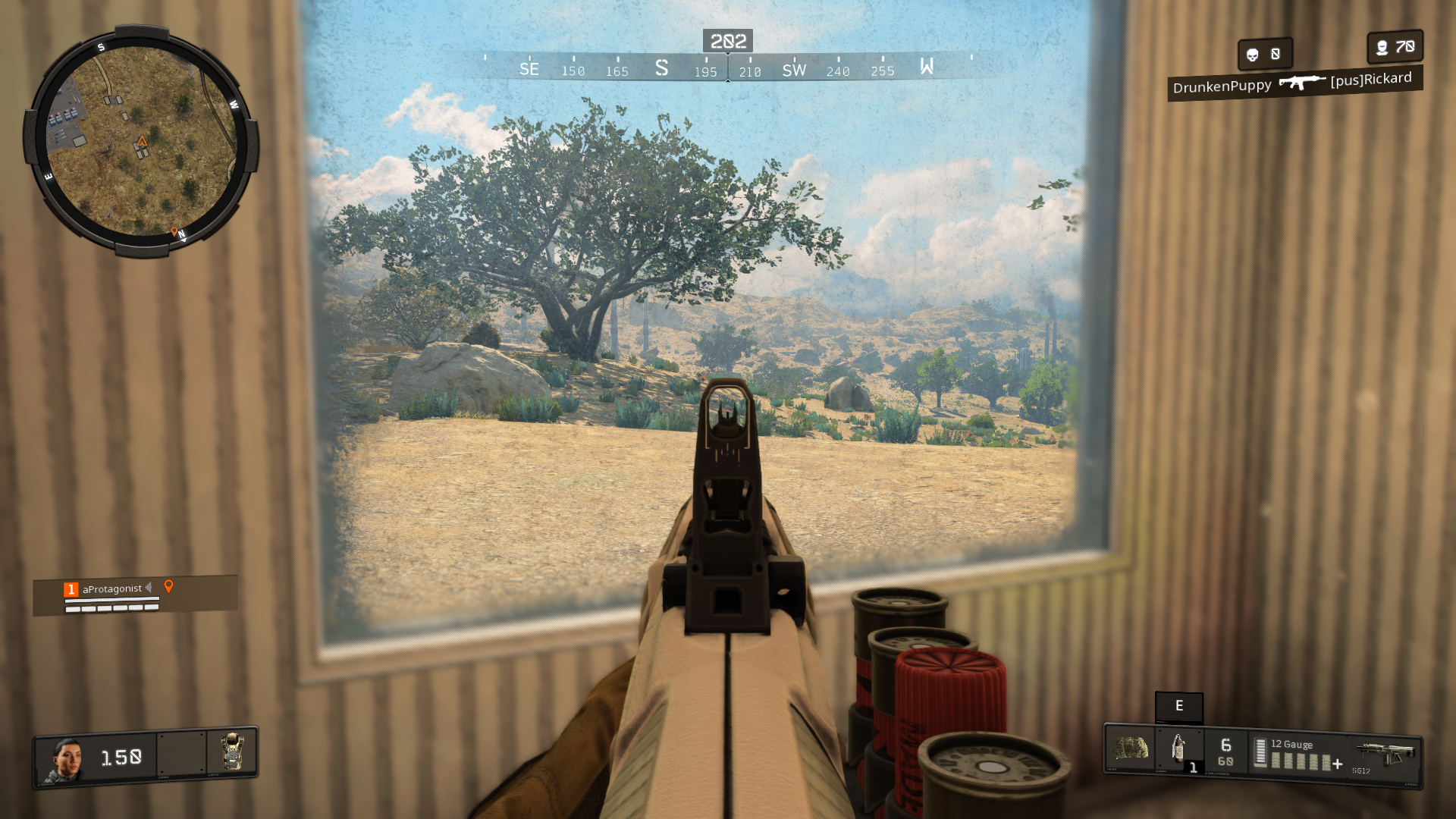
My attempts at piloting the vehicles in Blackout mostly led to disaster.
Though Blackout rewards sprints to high-spec loot zones with the expected superweapons and god-tier armor, Treyarch raises the usual floor for gear, which deflates much of the frustration that can accompany a bad run of matches. I rarely found myself without a pistol or rifle to defend myself with, even in the tense opening seconds of a match.
I loved feeling like I had a fighting chance, but the zombies who patrol parts of the map wore on me, especially since it made my preferred stealthy playstyle less viable. It's something PUBG and Fortnite don't have, but it's more of a nuisance than a legitimate tactical consideration.
For example, early in a Quads match, I managed to find a bolt-action sniper rifle and an accompanying scope, my preferred loadout for battle royale games. I never got a chance to use it, though, because a handful of zombies ran up on my crew and we had to give away our positioning by blowing them away. As we were killing the last of them, a rival squad tore into the warehouse and shot us in our backs, creating an ignominious end to the round. Battle royale games are at their best when you’re desperately improvising your way through an emergent situation, but the zombies are an unnecessary wrench in the gears that don’t add a lot to the game other than frustration—other players are enough to deal with, as are the vehicles.
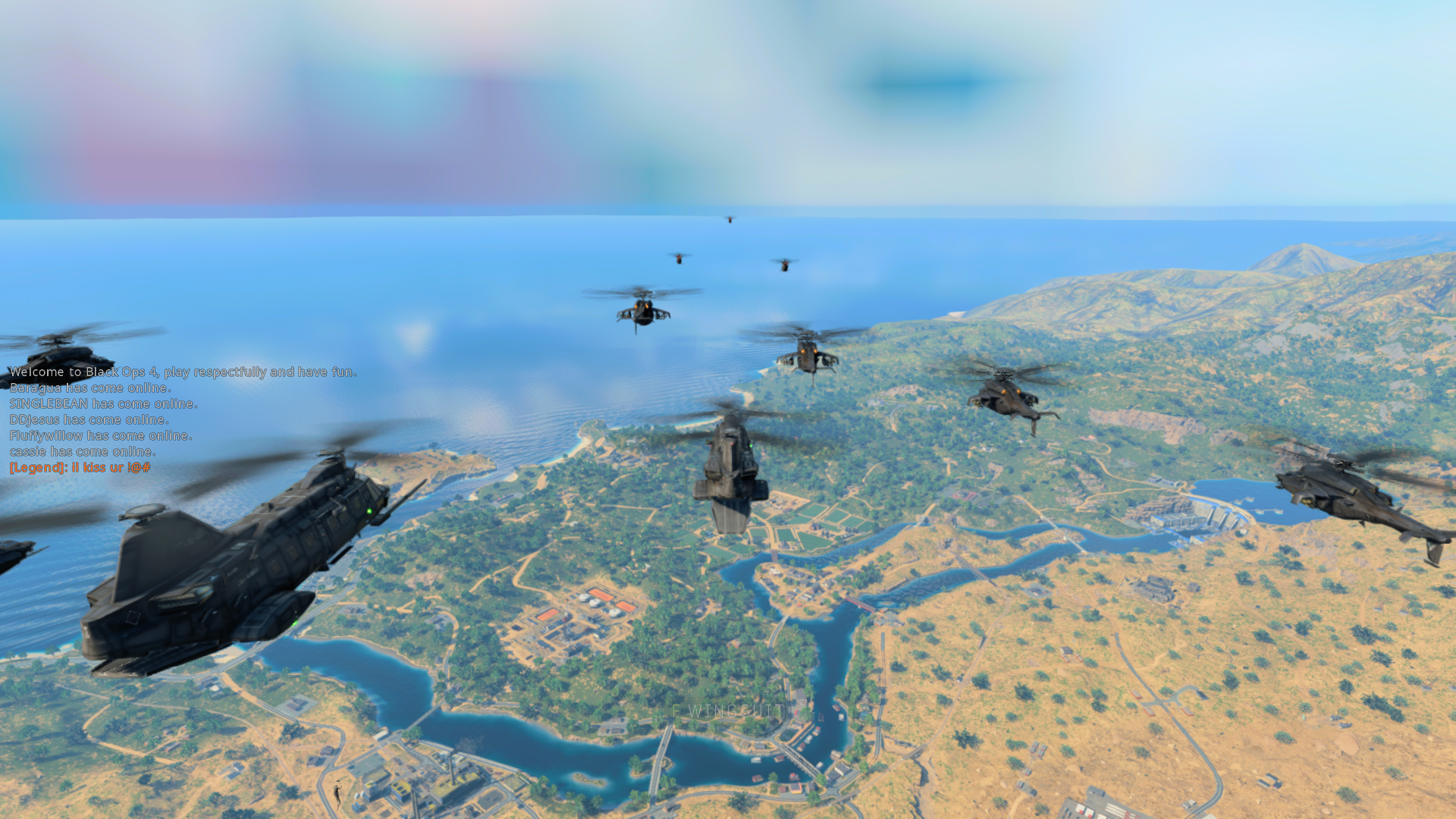
My attempts at piloting the vehicles in Blackout mostly led to disaster, but the snappy ATV is by far my favorite, handling best with a controller, though I switch back to keyboard and mouse once I’m back on-foot. It’s an easy way to zip up to an unsuspecting player without making yourself too much of a target, which is always a concern with battle royale vehicles. While it can be tough to tell when you’re packing a new weapon every game, the recoil patterns on the various rifles seem far more consistent than in previous games, which makes it easier to precisely blast down foes at mid-range. This left me relying on the slow-firing Rampart and a whatever shotgun I could find, rather than my CoD standby of the SMG-and-sniper combo. My trusty combo feels a bit ill-suited for the unpredictable open-field nature of most Blackout battles.
Compared its battle royale contemporaries, Black Ops 4 might be a refinement rather than a revolution, but it’s still the best version of a realistic battle royale (or at least, more realistic than Fortnite) that I’ve played—zombies aside—and I plan to go back to it for weeks to come. The messy gunfights and clutch finishes make me want to jump back in repeatedly, and that’s ultimately the metric that matters the most to me.
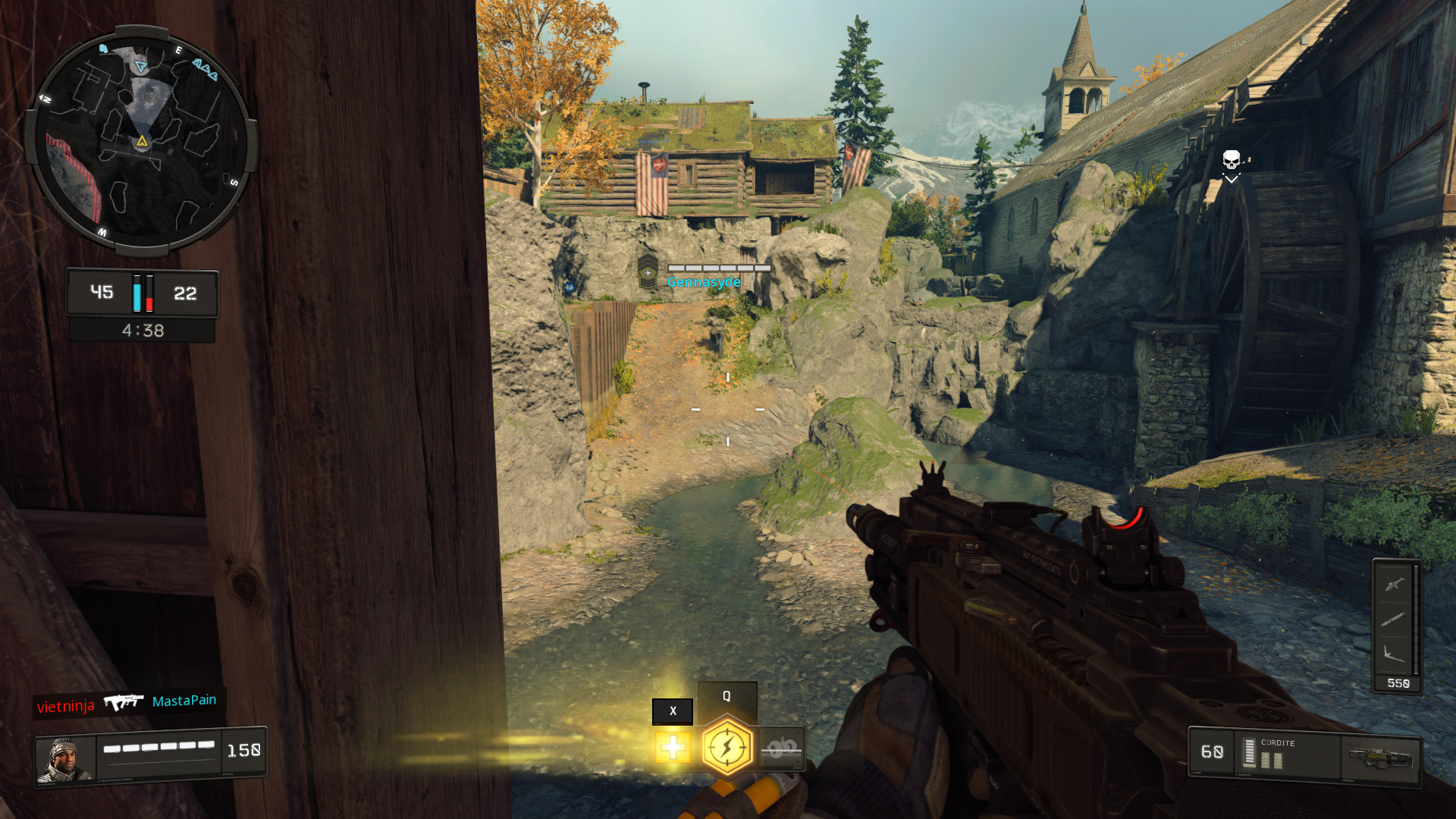
Boots back on the ground
This sense of familiarity extends to Black Ops 4’s traditional multiplayer modes. Treyarch has ditched the divisive Titanfall-esque wall-running and double-jumping of Black Ops 3 for a more grounded approach. I find that the simplified movement better suits Call of Duty’s pure, no-gristle take on the genre. Rather than throwing it all the way back to Black Ops 2, however, this new entry has doubled-down on the 'Specialist' system introduced in its third Black Ops, which layers character-specific abilities over the series’ enduring class system. Though comparisons to the flashy ultimates of Overwatch seem inevitable, these Specialists lean closer to the classes of Destiny’s Crucible, where your loadout matters just as much as the boots you inhabit, if not more.
I eventually found success as Prophet, a deep-voiced grunt who deploys a rolling drone that automatically seeks out targets and immobilizes them with a piercing shock. One particular highlight saw me clear a point of the entire enemy team with just his ultimate ability, a far-reaching shock rifle that paralyzes targets with a single shot. Though it felt great in the moment to snatch victory from the jaws of defeat with just a handful of mouse clicks, something about it just struck me as slightly off.
Since I devoured Modern Warfare as a teen in 2007, Call of Duty has always denoted a 'pure' shooting experience in my mind, untainted by RPG-like abilities and cooldowns. Perks and killstreaks are one thing, but area-of-effect flashbangs, Widowmaker-style wallhacks, and deployable accessories that redirect where your teammates respawn are a strange and clumsy direction for the series. Rather than the race of reflexes that bought the series to the dance, Black Ops 4 has lumbered into an uncomfortable middle ground between a pure twitch shooter and a game of tactical teamwork, shedding some of the series’ irresistible simplicity in the process.
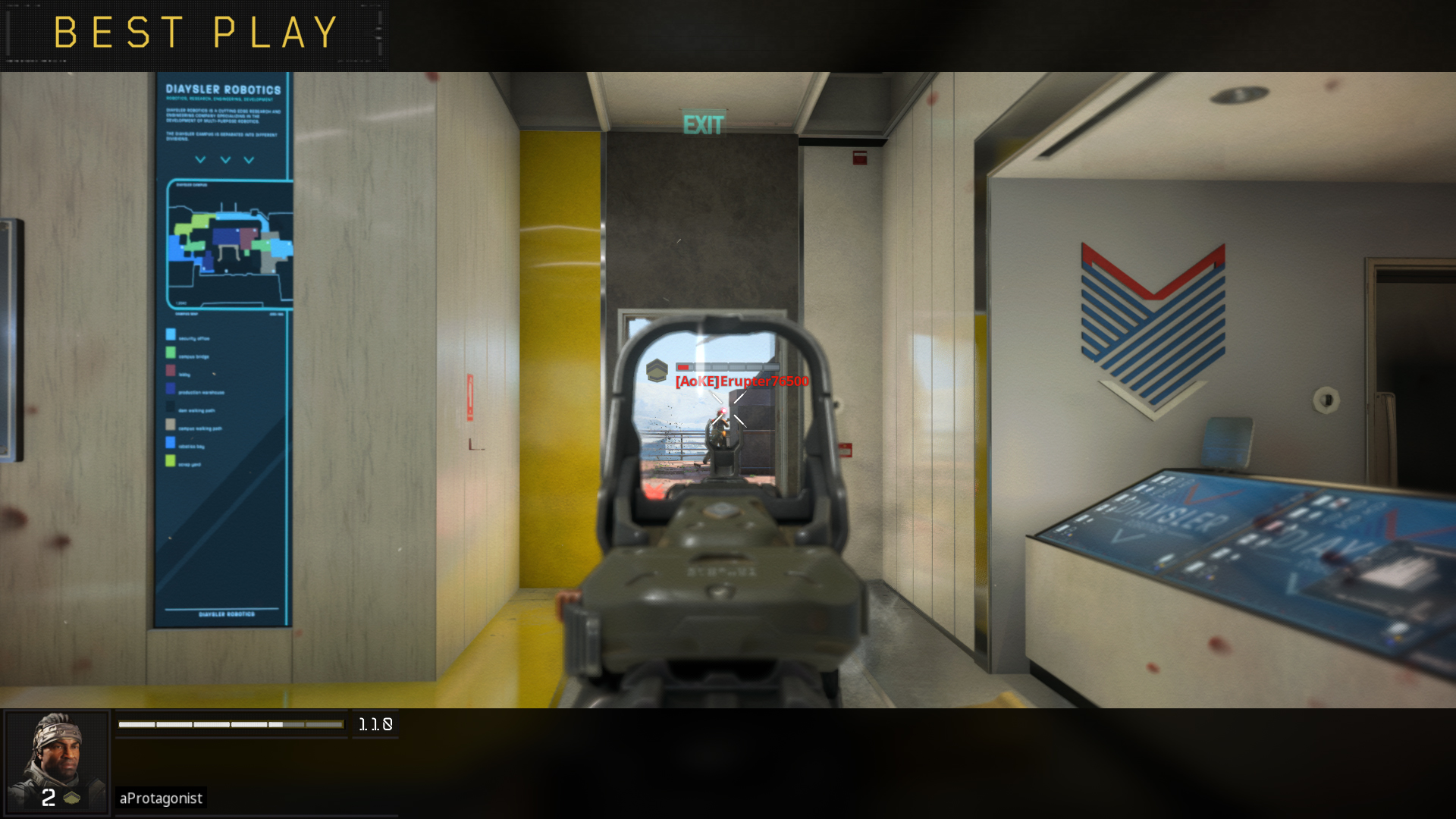
Treyarch succeeds at melding the series’ stellar shooting with a more careful and exacting playstyle.
Perhaps that’s why I so enjoyed the game’s new mode, Heist, which shunts the character abilities aside entirely in favor of a Counter-Strike-style buy-menu. After gearing up, two teams compete to locate a mound of cash and bring it to an exfil site all while grappling with each other. And there's no respawns to blunt any mistakes. Rather than the popular Team Deathmatch, where you can endlessly spawn with the same gear without a thought for strategy, Heist makes you consider the advantages and disadvantages of Black Ops 4's considerable armory from round to round.
When the enemy team were rushing us down with well-timed flashbangs and close-range SMG bursts, I saved my money to purchase a semi-automatic rifle and some helpful perks to engage them at range and turn the tide in the following rounds. They responded a few rounds later by counter-sniping me, so I switched to a mid-range rifle to try to cover both bases. It’s not exactly the Art of War, but it brings a welcome measure of tit-for-tat tactical depth to a game that feels mindless at times. While Heist certainly owes several debts of gratitude to its obvious inspiration (much like Blackout), Treyarch succeeds at melding the series’ stellar shooting with a more careful and exacting playstyle. The result is my favorite mode since Modern Warfare’s Domination.
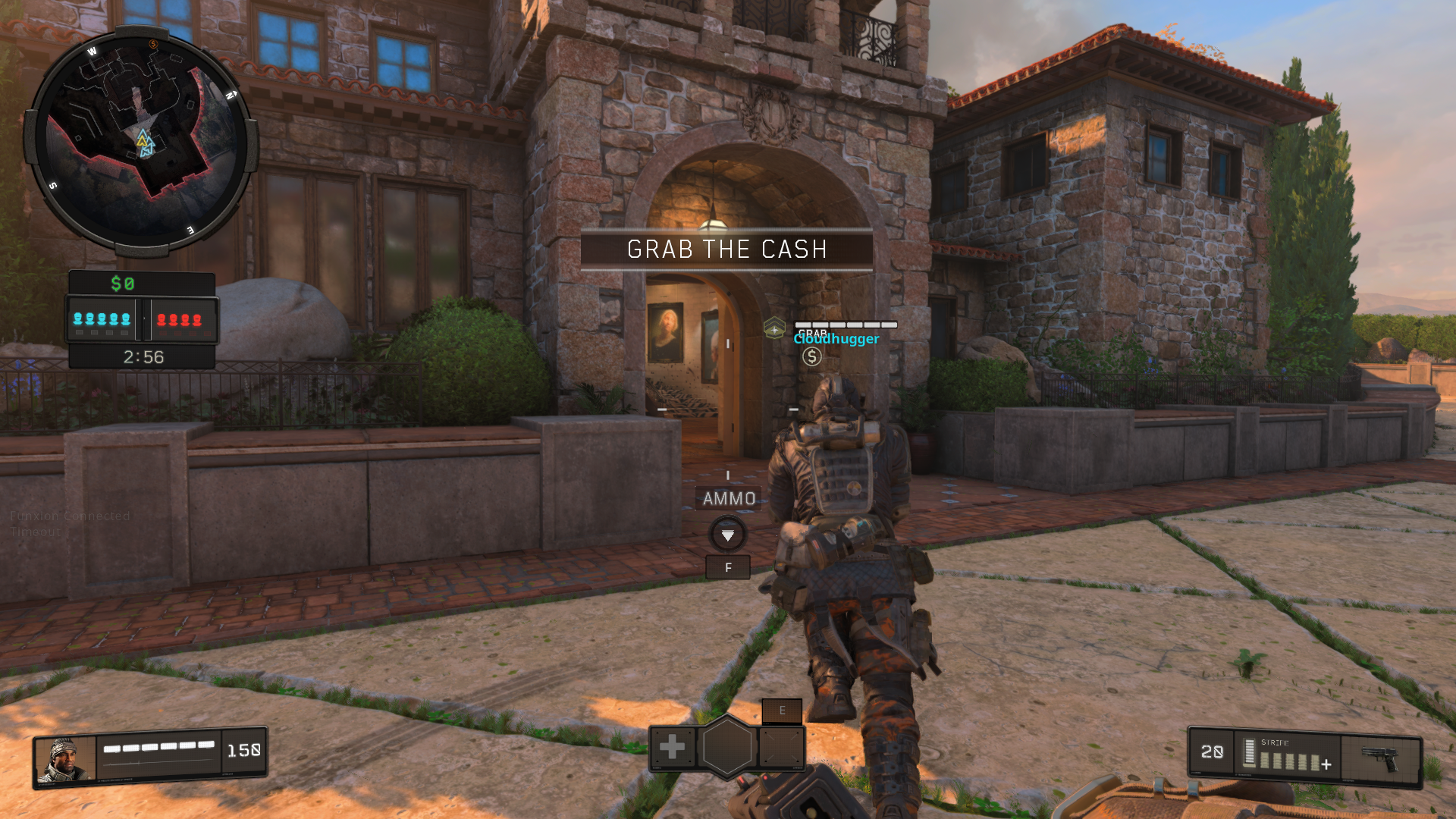
The unwelcome undead
The final leg of Black Ops 4’s three-pronged approach is its Zombies mode, one of the unique selling points of the Black Ops sub-series. I admire the complex, obscure subsystems and subgoals that you have to master to achieve a 50-round run on the new IX map, but they’re layered over a foundation that boils down to a very pretty but very static shooting gallery occasionally broken up by bullet-sponge super-zombies with little in the way of personality. The lack of clear linear progression or an objective besides 'shoot the zombies' makes the mode rather opaque to newcomers. While that was fun enough in short bursts, I eventually got sick of dying on wave 11.
The only other option is to strive for mastery through trial and error, figuring out the complexities of the bonus-bestowing Pack-a-Punch machine or the ideal build to synergize with your teammates. I just didn’t have much of a drive to continue down that road. Even when it comes to the rote zombie-blasting, the ever-ballooning health of the basic undead makes it hard to judge priority targets, or the efficacy of your arsenal. I eventually made it into the 30s after sacrificing some heads to an altar to upgrade my machinegun enough to cut through the hordes of undead like a butcher’s knife through a soft peach. When I eventually died, however, I didn’t quite feel like going through the motions again. The big gun made me feel powerful, but it didn’t solve the mode’s underlying issues.
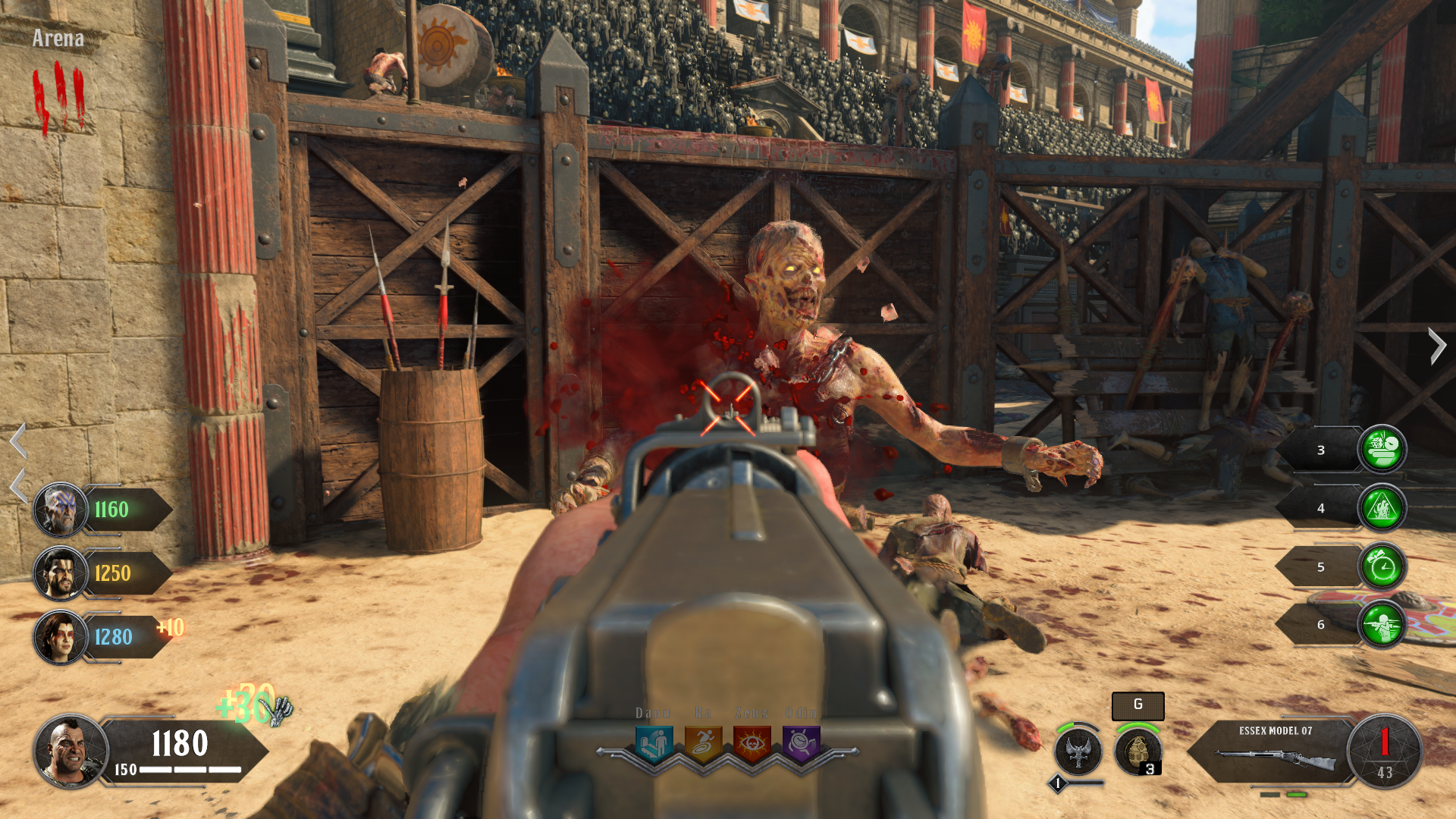
It can be hard to remember that this is the series that redefined the online shooter just a decade ago.
There's an absolute ton of undead to slaughter in Black Ops 4, including two brand-new maps and a remake of Black Ops 2’s Mob of the Dead, along with a remake of the original Black Ops’ Five that comes with the optional season pass. But after over fifteen hours of headshotting the undead, I felt a deep urge to play through Left 4 Dead 2 again. Zombies lacks that series’ clarity of direction and randomized replayability, as well as a diverse crew of super-undead that keeps it from feeling like Whack-A-Mole. I had much more fun with Black Ops 4's new Rush mode, which pits players against each other in an murder race to see who can gather the most points by offing zombies. For me, this conjured the simple pleasures of the arcade that World at War’s original Zombie mode hearkened back to.
It’s worth noting that I’ve experienced some serious stability problems while playing the game on my home PC (part of my time playing was also at an Activision review event). Though it runs for hours without incident, I’ve had occasional crashes in virtually every mode, some in the middle of games. Also, Black Ops 4's invite and party systems need some work. My friends constantly have issues joining my party, and they get booted from it between games with no explanation. Other than that, the game runs like a dream, giving me a solid 60-plus fps at all times on my GTX 1080.
It can be hard to remember that this is the series that redefined the online shooter just a decade ago. Black Ops 4 is what it says on the back of the box, and little more, but the weapons are fun to use (particularly Prophet’s shock rifle, which never gets old) and its lighter, faster take on battle royale is best-in-class, at least at this early juncture for the genre. So even though nothing about it is surprising, this year's CoD still gives me what I want after 15 years of blasting through the series: all-adrenaline, with guns that are a joy to use. That's good enough for me.
A quality-made but unsurprising multiplayer FPS that offers refined versions of the current most popular modes and top-tier shooting.


